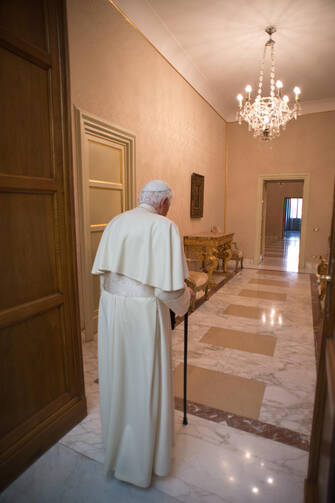In his first night as pontiff emeritus, the Vatican says, Benedict slept peacefully. Perhaps not everyone else has.
The cardinals have set their first General Congregation for Monday, March 4, not as some mistakenly wrote, to begin the conclave, but to consider the housekeeping tasks of the sede vacante and possibly to set a date for the conclave to begin.
The conclave will choose one of their number, but the discussion is about the issues he will face.
In an interview with Catholic News Service, Cardinal Dolan says the church faces three problems an ecclesiological problem (people have an issue not with God, not with Jesus, but with the church), a vocation problem (not just to priesthood and religious life, but to marriage, as Catholic marriage falls to the level of the surrounding society), a religious freedom problem.
The transition was for the second day in succession on the front page of The New York Times (“Discord Remains at Vatican as Pope Benedict Departs”), with a story that related that the Italian magazine Panorama reported that the Vatican investigation of leaks and other misconduct used wiretaps on church officials, an assertion not denied by the Vatican press office. “Although Benedict has said that he is retiring ‘freely and for the good of the church,’ leaving its guidance to someone younger and stronger than he, the scandals have weighed on the cardinals entering the conclave,” the Times reports.
There is a long reconstruction of the Vatileaks episode in the February issue of the American magazine GQ by Sean Flynn. It portrays the butler who appears to be the instigator as “The Spy Who Loved Me,” and it rings true. What is clear is that Paolo Gabriele, who served the papal household for many years, finally as Benedict’s butler, was pious and well-intentioned. Think US Army Private First Class Bradley Manning of the WikiLeaks case, but far more senior.
In Britain, where thoughts about the coming conclave are dominated, perhaps, by the fact that the most senior British churchman, Cardinal Keith O’Brien, will not be present following accusations of personal sexual misconduct, the leading independent Catholic journal highlights the current crisis in an editorial in the latest issue. The issues go beyond the far-reaching sexual abuse problem, says the editor of The Tablet:
“But the most significant crisis in the Church is the breakdown in koinonia – love, trust and fellowship – between the hierarchy on one hand, and priests and people on the other. If the leaders of the Church are not careful, the laity could desert in droves. A retreat could accelerate into a rout.
“The major question facing the forthcoming conclave is how to turn round this collapse of confidence before it is too late. And that demands a far-reaching reform of structures, including giving the laity the right to participate in church decision-making. Yet even the tentative proposal for diocesan pastoral councils contained in Vatican II’s decree Christus Dominus has been widely ignored. The Vatican is not interested. The laity, it has clearly decided, is not to be trusted. It has to be said, the feeling has become mutual.”
The problem is not a clash of personalities, but a failure of structure, The Tablet says. “An institution with 1.2 billion members all over the globe cannot be run by what is essentially an unreformed Renaissance monarchy and its elderly cosseted courtiers.”
In its ecumenical work, the church of Rome has envisioned a synodical government with a Petrine papacy holding it together. Such governance must involve the laity. “The church has put vast resources into producing an educated laity, and an educated laity demands to be heard.
“There is a big reform agenda here. If the conclave rushes to a quick decision, it may miss a unique opportunity to address issues which are deeply troubling in the Church and which, if left unattended, could have catastrophic consequences.”
And the television network news organization ABCNews carried this analysis from David Wright:
“The new pope will set the tone of the institution on issues of life and death: abortion, birth control, genetic medicine, euthanasia and more. He’ll frame the church’s role in the moral debate about the way people live their lives, as individuals and as families. Divorce, gay rights, adoption, education, the role of women (not least in the church) are all areas in which previous pope’s have exerted tremendous influence. He’ll instantly be the most powerful spiritual leader in the world, a global ambassador for Christian values (however he and the rest of the church interpret that mandate).”
The choice is the result of prayer and conflict among the careerists who predominate in the College of Cardinals, but the stakes are enormous, Wright reminds us. “It would be sheer exaggeration to say any presidential contest were a battle for the soul of the United States.But in a very real way that’s what this process is for the world’s largest church.”
Thank you to those who have responded to these first postings for my friends at America magazine. I am grateful for the thoughts. Our plan is to take the weekends off, and so we will resume Monday as the cardinals hold their first meeting. We will watch and hope.








